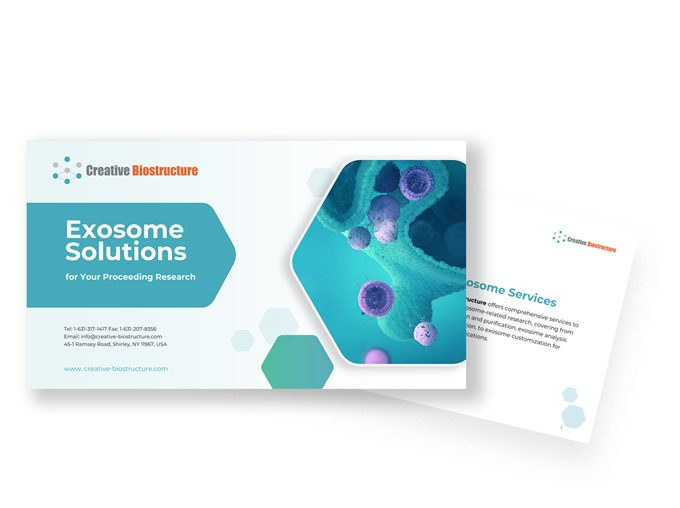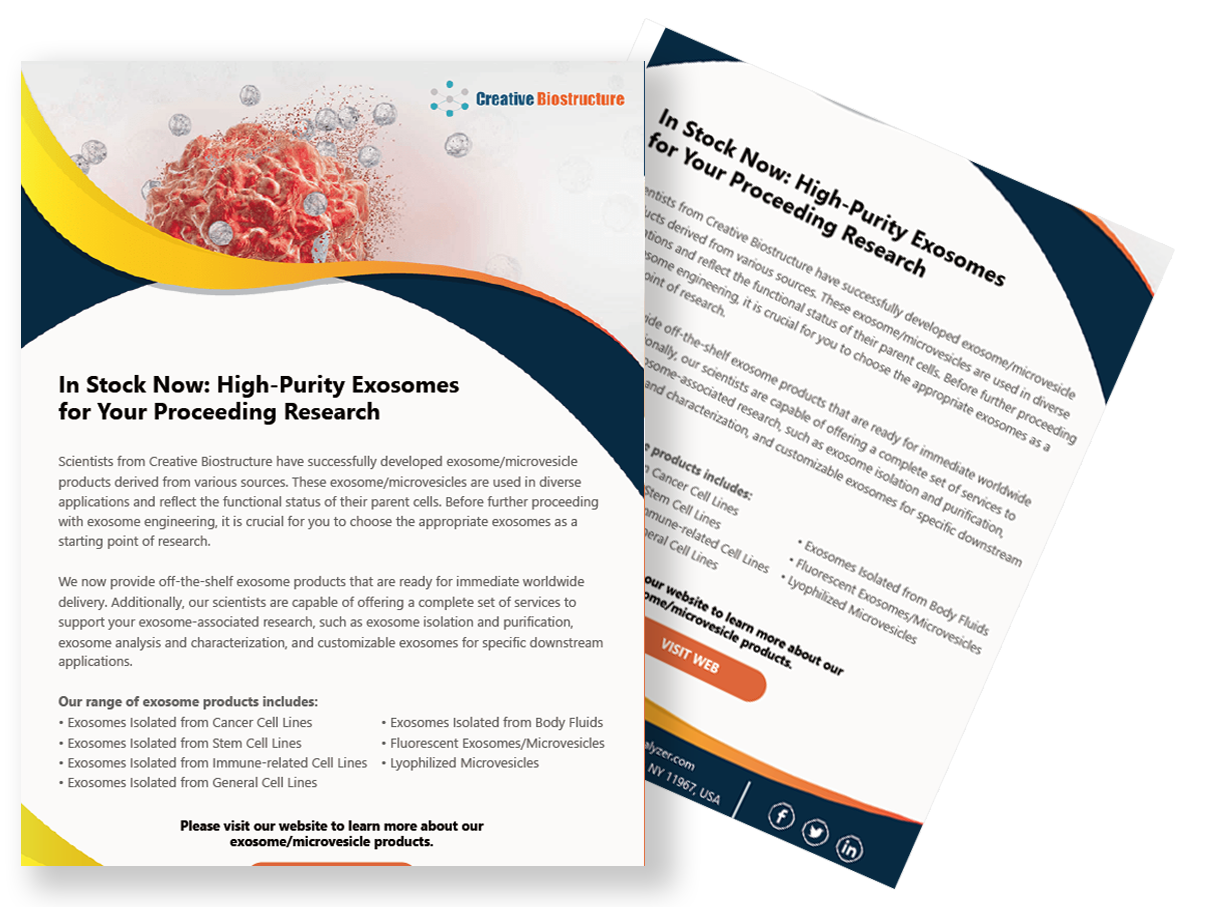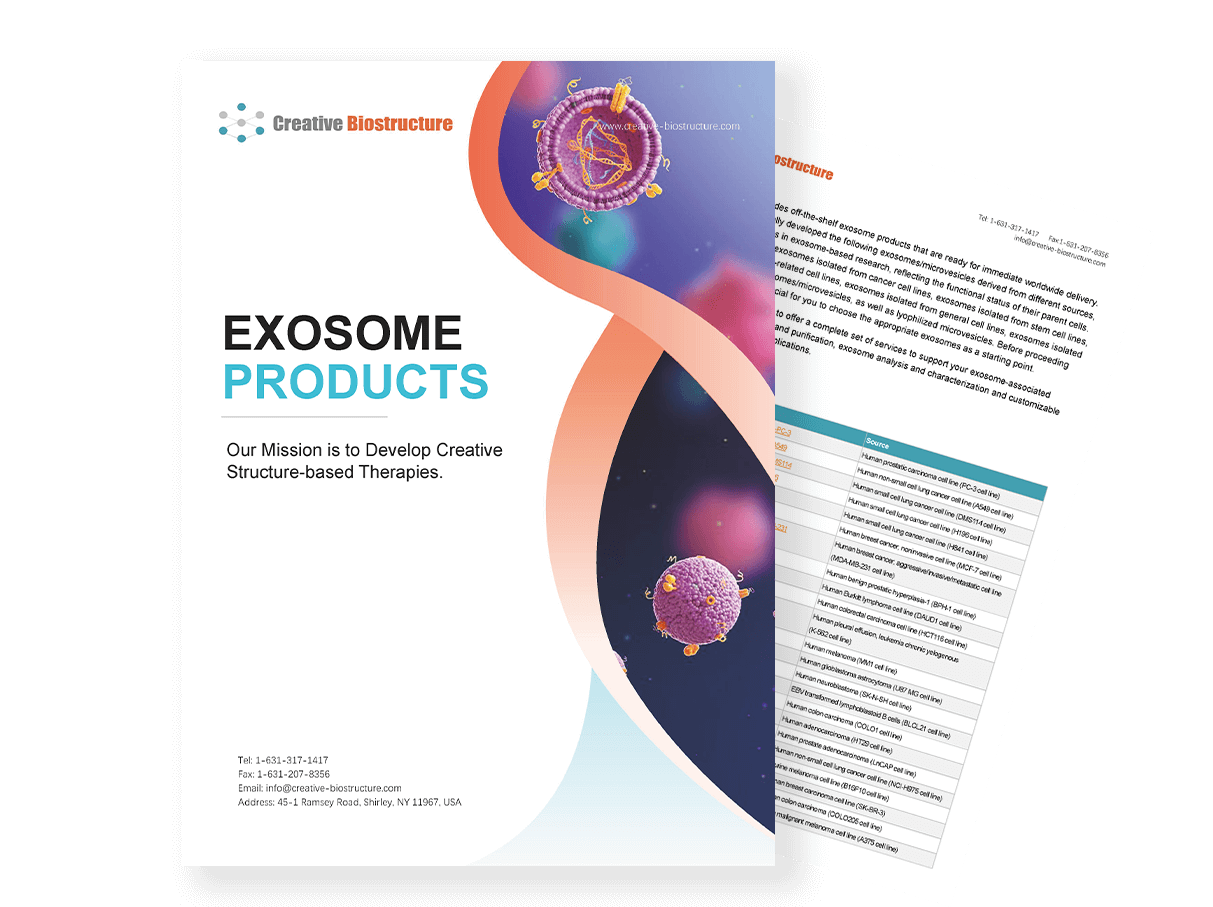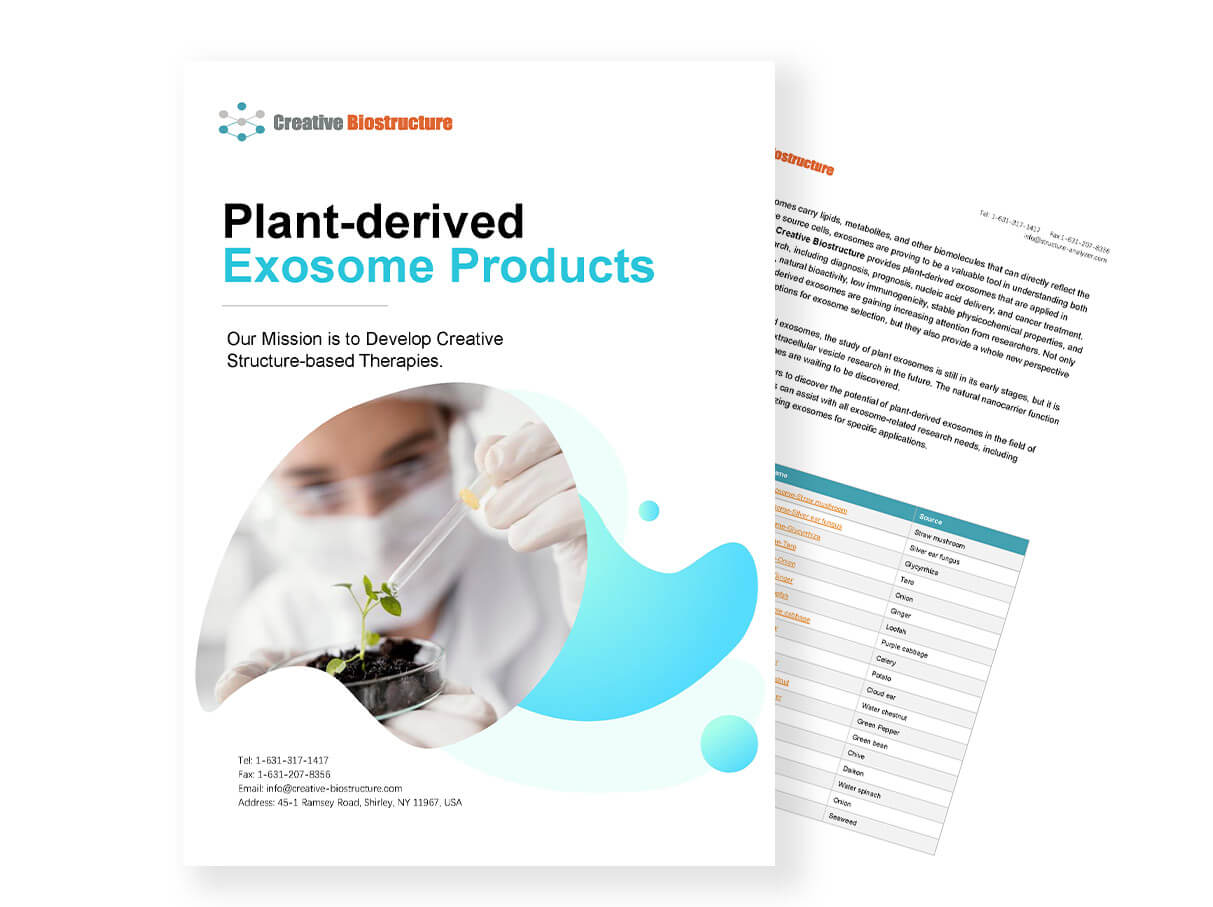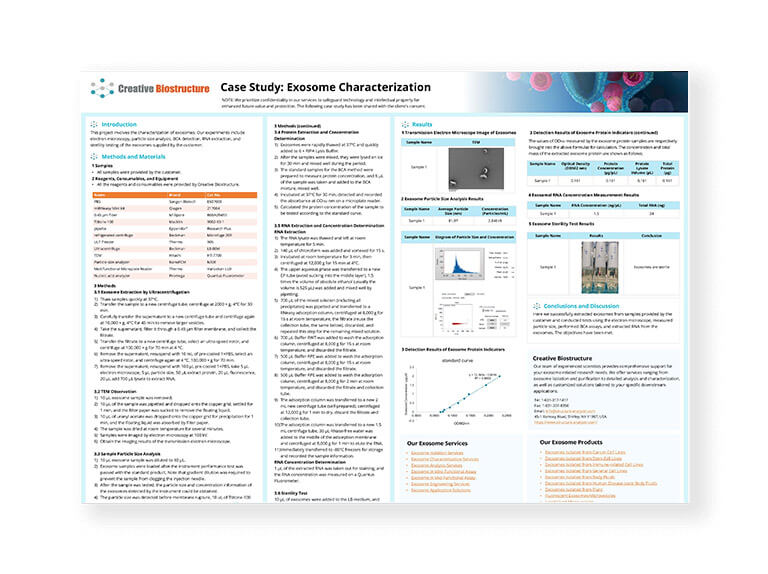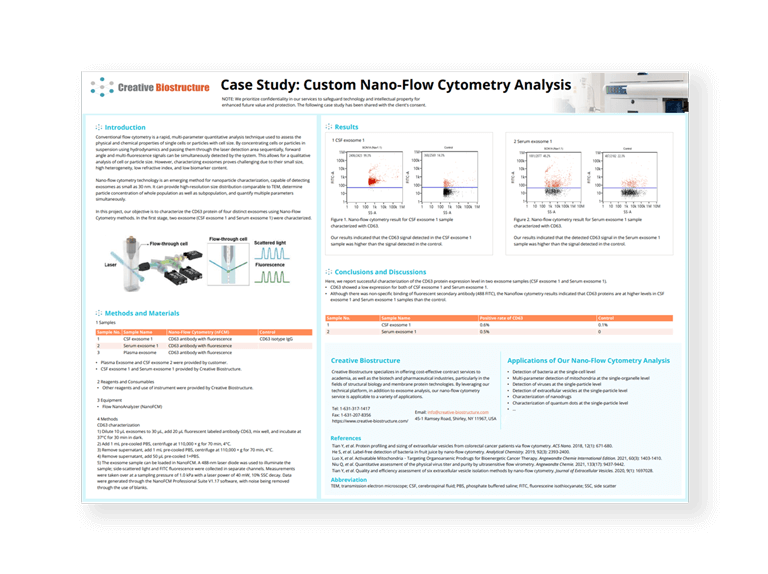Exosome Analysis Services
To acquire a deeper knowledge of exosome biology and accelerate the use of these extracellular vesicles in diagnostic tests or clinical research, Creative Biostructure provides sensitive and reproducible methods for exosome analysis.
Why Do You Need to Analyze Exosomes?
- Comprehensive Molecular Insights: Exosomes contain various biomolecules, including proteins, lipids, nucleic acids, and metabolites. Analyzing these components can provide comprehensive insights into cellular processes and disease mechanisms.
- Early Detection and Disease Monitoring: Exosomes can be easily enriched from biofluids and carry unique molecular signatures. This makes them valuable for early detection and continuous monitoring of diseases, especially cancers.
- Pathological Relevance: The composition and quantity of exosomes are often directly related to the pathological state of a patient. Analyzing exosomes can therefore offer critical information for diagnosing and prognosticating various diseases.
- Biomarker Discovery: Exosome analysis facilitates the identification of biomarkers, which are essential for developing non-invasive diagnostic tests and monitoring treatment responses.
Exosome Analysis Services at Creative Biostructure
Creative Biostructure's exosome analysis services make it easy to profile exosome lipids, proteins, and RNAs, backed by our years of experience working with exosomes. Our expertise offers comprehensive support for your exosome studies.
Exosome Tracking Service
The exosome tracking service enables real-time monitoring and visualization of the dynamic distribution and functionality of exosomes within living organisms. Leveraging our significant expertise in exosome projects, we support customers in acquiring profound insights into the intricate mechanisms of exosomes in biological processes, offering crucial assistance for their clinical applications.
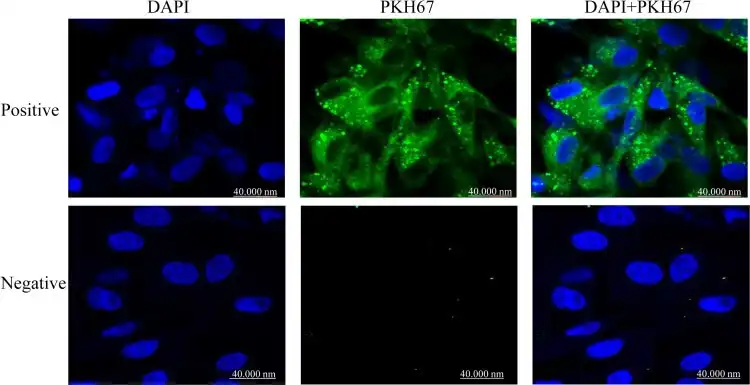 Figure 1. Uptake of PKH67 labeled exosomes by granulosa cells after co-incubation in vitro. (Saeed-Zidane, et al., 2017).
Figure 1. Uptake of PKH67 labeled exosomes by granulosa cells after co-incubation in vitro. (Saeed-Zidane, et al., 2017).
Nano-Flow Cytometry (nFCM) Service
Nano-flow cytometry (nFCM) technology is an emerging method for nanoparticle characterization that can detect exosomes as small as 30 nm. It provides high-resolution size distribution comparable to transmission electron microscopy (TEM), determines particle concentrations for entire populations as well as subpopulations, and quantifies multiple parameters simultaneously.
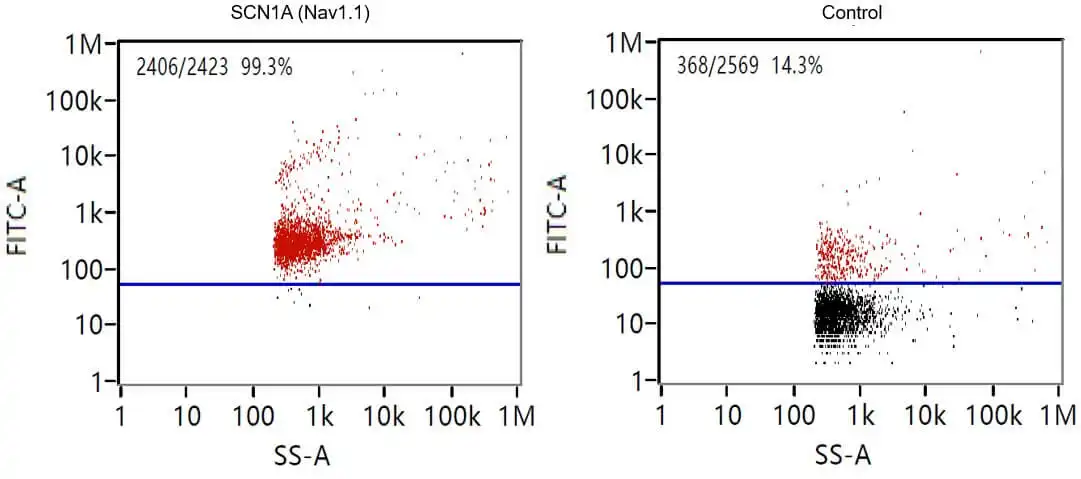 Figure 2. nFCM result for CSF exosome characterized with CD63. (Creative Biostructure)
Figure 2. nFCM result for CSF exosome characterized with CD63. (Creative Biostructure)
Exosome RNA Sequencing Service
Nucleic acids are another important cargo that exosomes carry, including deoxyribonucleic acids (DNA) and coding and non-coding ribonucleic acids (RNA) such as messenger RNA (mRNA) and microRNA (miRNA). After exosome isolation, nucleic acids need to be accurately quantified to track various medical conditions and diseases, especially when the nucleic acids of exosomes differ significantly from the parental cell content.
Creative Biostructure provides a complete exosome workflow solution to analyze the nucleic acid profiles of exosomes, starting from fast and efficient RNA isolation to exosome RNA sequencing using qRT-PCR and novel sequencing techniques.
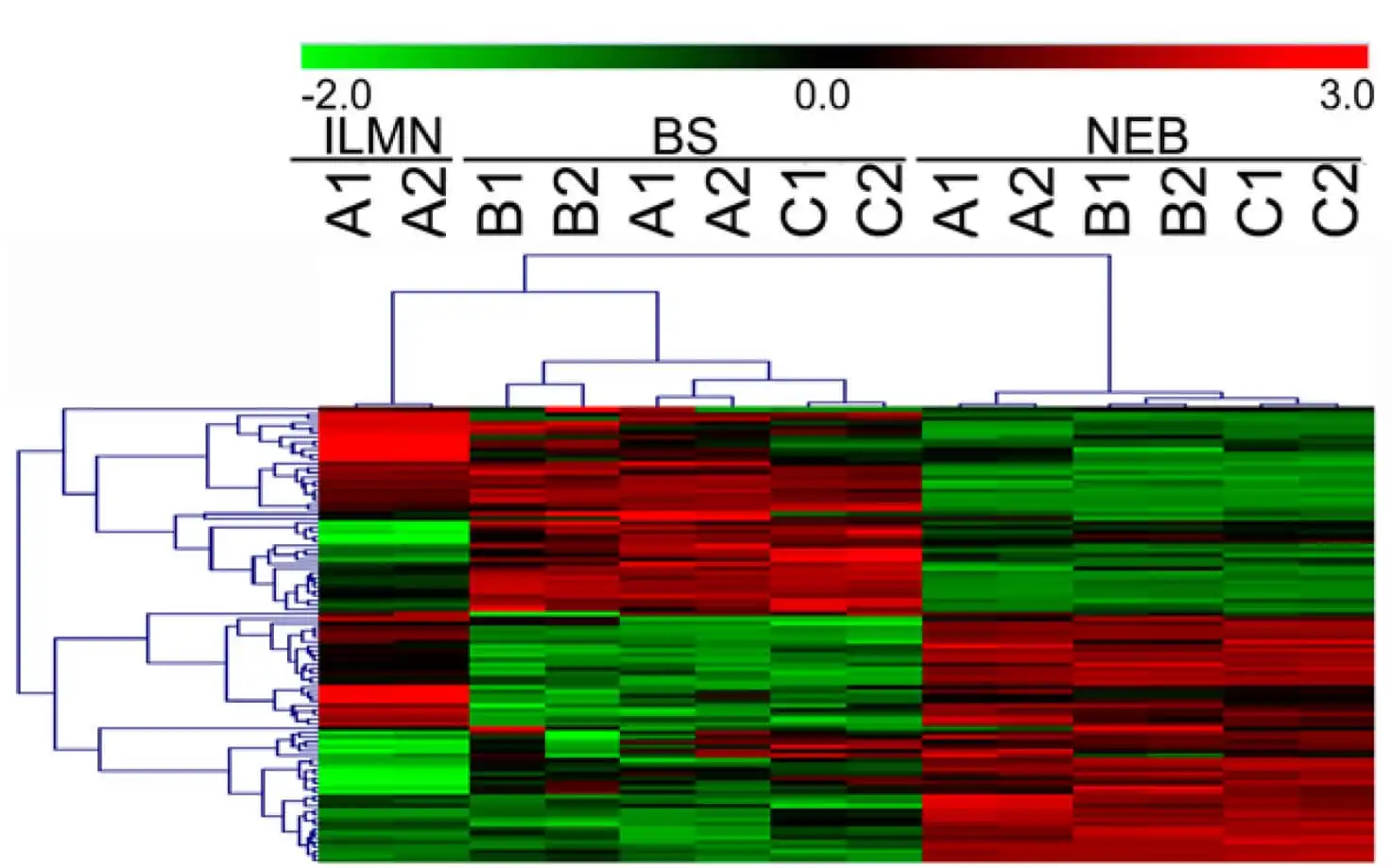 Figure 3. Differentially expressed miRNAs. (Creative Biostructure)
Figure 3. Differentially expressed miRNAs. (Creative Biostructure)
Exosome Gene Verification Service
Exosome gene verification facilitates the assessment of gene expression under various conditions, illuminating disease mechanisms and aiding in the identification of therapeutic targets and biomarkers. By accurately verifying gene expression within exosomes, researchers can gain insights into how exosomal contents reflect the cellular environment, which is essential for studying disease states, treatment responses, and overall cellular health.
Exosome Lipidomics & Metabolomics Service
Lipids, an important part of cellular physiology, are major components of exosomes. The significance of lipids in exosome biology is highlighted by the fact that the lipid content of exosomes differs from that of parent cells and changes during physiological processes. Studying exosome lipidomics offers valuable opportunities to identify lipid-based biomarkers and understand their role in disease monitoring. Additionally, a wide range of exosome metabolites can be used for biomarker discovery, as they exhibit distinct metabolite profiles during different stages of disease treatment.
Our customized services provide comprehensive support for exosome lipidomics and metabolomics studies by utilizing various analytical methods for data acquisition, analysis, and interpretation, including thin layer chromatography (TLC), high-performance liquid chromatography (HPLC), NMR spectroscopy, and mass spectrometry.
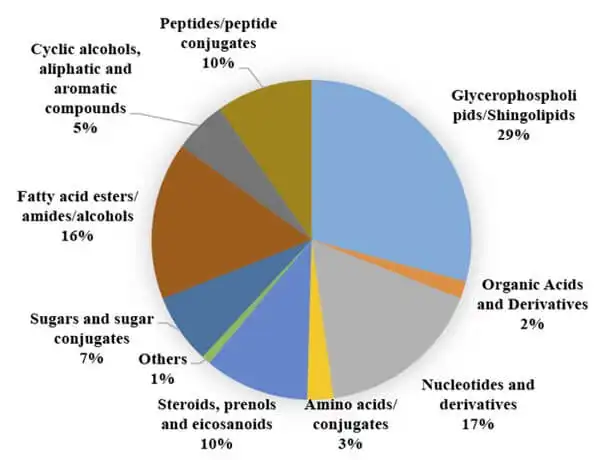 Figure 4. Characterization of the metabolite content of human plasma exosome-like vesicle. (Altadill et al., 2016)
Figure 4. Characterization of the metabolite content of human plasma exosome-like vesicle. (Altadill et al., 2016)
Exosome Proteomics Service
Exosome proteomics has been recognized as a valuable approach for biomarker monitoring, providing insights into the physiological state of parent cells and exosomes. For analysis by mass spectrometry, exosome proteins can be separated by SDS-PAGE, in-gel digested , and then analyzed by LC-MS/MS experiments. Based on our customers' needs, we offer services ranging from exosome isolation to data collection and analysis, culminating in a final report with the results.
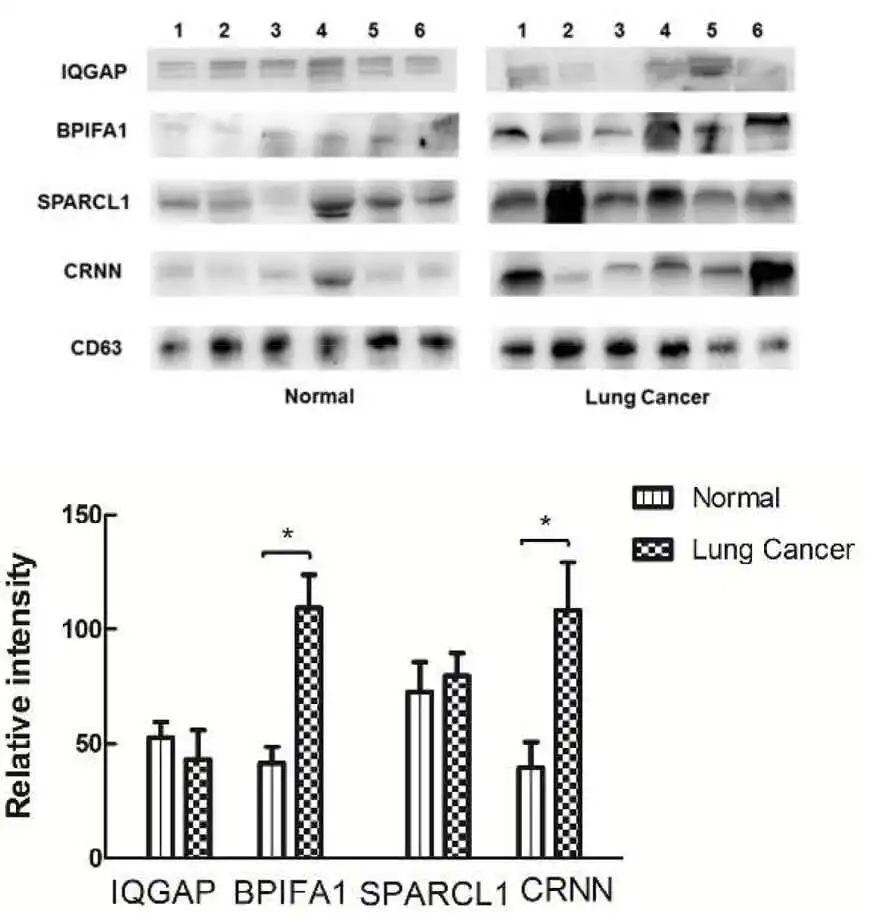 Figure 5. Exosome proteomics analysis from human saliva. (Sun et al., 2018)
Figure 5. Exosome proteomics analysis from human saliva. (Sun et al., 2018)
Exosome Modification Omics Analysis Service
Exosome modification omics studies the modifications of proteins, nucleic acids, lipids, and other molecules in exosomes, such as phosphorylation, glycosylation, ubiquitination, and methylation. These modifications impact the structure, stability, and function of molecules, influencing the biological effects of exosomes. Research methods include high-throughput sequencing, mass spectrometry, and immunoblotting. This field comprehensively analyzes modification types, sites, and levels in exosomes to reveal their functional impacts.
Exosome Microbiomics Analysis Service
Exosome microbiomics analysis is a rapidly growing field in life science research. We provide advanced services to study the complex interactions between exosomes and microorganisms. Exosomes can defend against microorganisms by delivering immune molecules and encapsulating pathogens to prevent further infection. Conversely, microorganisms can influence exosome production and function, using them to regulate immune responses and facilitate cross-cellular transmission.
Exosome Model Evaluation Service
The functional evaluation of cell and animal models in exosome technology services is a key step in assessing the biological functions and pharmacological properties of exosomes, providing a scientific basis for their clinical application. Creative Biostructure has a comprehensive technology platform and extensive service experience, offering a variety of exosome model functional evaluation services.
Exosome Spatial Omics Service
The integration of spatial transcriptomics and proteomics in exosome spatial omics allows for the precise mapping of exosomes' positions and interactions within their native tissue environments. This technique addresses the spatial constraints inherent in conventional single-cell sequencing methods, which is essential for a thorough understanding of biological processes and disease mechanisms. By analyzing the spatial dynamics of exosomes, researchers can gain a deeper insight into their roles in various physiological and pathological states, such as within tumor microenvironments, neurodegenerative conditions, and immune system responses.
Exosome Targeting Peptide Screening Service
Creative Biostructure offers Exosome Targeting Peptide Screening services for research applications. Using phage display technology, we identify high-affinity peptides to enhance exosome targeting, supporting studies in drug delivery, gene therapy, and biomarker discovery.
Technology Platforms
Key Advantages
- Comprehensive Analysis: Offers a full spectrum of exosome analysis, including RNA sequencing, lipidomics, metabolomics, proteomics, and tracking.
- High Sensitivity: Capable of detecting and quantifying even low-abundance molecules within exosomes, providing detailed insights.
- Detailed Characterization: Provides in-depth profiling of exosome contents, including proteins, lipids, metabolites, and RNA, ensuring comprehensive data for research and development.
- High Resolution: Our nano-flow cytometry (nFCM) service offers high-resolution analysis of individual exosomes, enabling precise characterization of their size, concentration, and surface markers.
- Expertise and Reliability: Delivered by a team of experienced professionals, ensuring high-quality and reliable results tailored to meet specific research needs.
Resources
Frequently Asked Questions
-
What types of biofluids can you analyze for exosomes?
We can analyze exosomes from various biofluids including blood, urine, saliva, cerebrospinal fluid, and breast milk.
-
What information can I gain from exosome analysis?
Exosome analysis can provide insights into molecular signatures, protein and RNA content, and potential biomarkers for disease diagnosis, progression monitoring, and therapeutic responses.
-
Can you help with the interpretation of exosome analysis results?
Yes, our team of experts can provide comprehensive data interpretation and support, helping you understand the implications of the findings and how they relate to your specific research objectives.
Ordering Process
References
- Biting Zhou et al. Application of exosomes as liquid biopsy in clinical diagnosis. Signal Transduct Target Ther. 2020, 5: 144.
- Sitar Simona et al. Size characterization and quantification of exosomes by asymmetrical-flow field-flow fractionation. Anal Chem. 2015, 87(18): 9225-9233.
- A comprehensive view of the characterization of exosomes. Sponsored by Wyatt Technology. 2018.
- Tatiana Altadill et al. Enabling metabolomics based biomarker discovery studies using molecular phenotyping of exosome-like vesicles. PLoS One. 2016, 11(3): e0151339.
- Alicia Llorente et al. Molecular lipidomics of exosomes released by PC-3 prostate cancer cells. Biochim Biophys Acta. 2013, 1831(7): 1302-1309.
- Kevin L Schey et al. Proteomics characterization of exosome cargo. Methods. 2015, 87: 75-82.
- Jeoffrey Schageman et al. The complete exosome workflow solution: from isolation to characterization of RNA cargo. Biomed Res Int. 2013, 2013: 253957.
